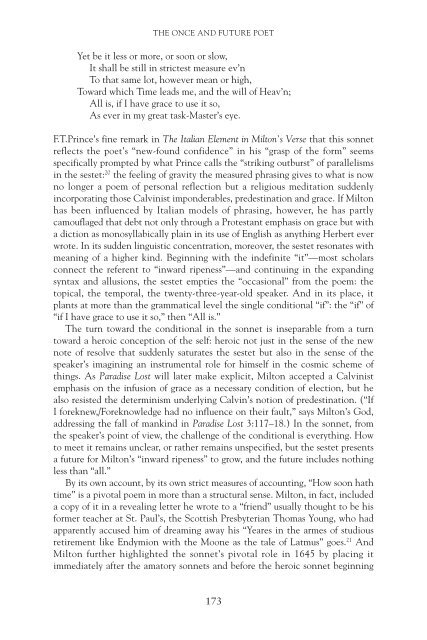ENG LYRIC POETRY.pdf - STIBA Malang
ENG LYRIC POETRY.pdf - STIBA Malang
ENG LYRIC POETRY.pdf - STIBA Malang
Create successful ePaper yourself
Turn your PDF publications into a flip-book with our unique Google optimized e-Paper software.
THE ONCE AND FUTURE POET<br />
Yet be it less or more, or soon or slow,<br />
It shall be still in strictest measure ev’n<br />
To that same lot, however mean or high,<br />
Toward which Time leads me, and the will of Heav’n;<br />
All is, if I have grace to use it so,<br />
As ever in my great task-Master’s eye.<br />
F.T.Prince’s fine remark in The Italian Element in Milton’s Verse that this sonnet<br />
reflects the poet’s “new-found confidence” in his “grasp of the form” seems<br />
specifically prompted by what Prince calls the “striking outburst” of parallelisms<br />
in the sestet: 20 the feeling of gravity the measured phrasing gives to what is now<br />
no longer a poem of personal reflection but a religious meditation suddenly<br />
incorporating those Calvinist imponderables, predestination and grace. If Milton<br />
has been influenced by Italian models of phrasing, however, he has partly<br />
camouflaged that debt not only through a Protestant emphasis on grace but with<br />
a diction as monosyllabically plain in its use of English as anything Herbert ever<br />
wrote. In its sudden linguistic concentration, moreover, the sestet resonates with<br />
meaning of a higher kind. Beginning with the indefinite “it”—most scholars<br />
connect the referent to “inward ripeness”—and continuing in the expanding<br />
syntax and allusions, the sestet empties the “occasional” from the poem: the<br />
topical, the temporal, the twenty-three-year-old speaker. And in its place, it<br />
plants at more than the grammatical level the single conditional “if”: the “if” of<br />
“if I have grace to use it so,” then “All is.”<br />
The turn toward the conditional in the sonnet is inseparable from a turn<br />
toward a heroic conception of the self: heroic not just in the sense of the new<br />
note of resolve that suddenly saturates the sestet but also in the sense of the<br />
speaker’s imagining an instrumental role for himself in the cosmic scheme of<br />
things. As Paradise Lost will later make explicit, Milton accepted a Calvinist<br />
emphasis on the infusion of grace as a necessary condition of election, but he<br />
also resisted the determinism underlying Calvin’s notion of predestination. (“If<br />
I foreknew,/Foreknowledge had no influence on their fault,” says Milton’s God,<br />
addressing the fall of mankind in Paradise Lost 3:117–18.) In the sonnet, from<br />
the speaker’s point of view, the challenge of the conditional is everything. How<br />
to meet it remains unclear, or rather remains unspecified, but the sestet presents<br />
a future for Milton’s “inward ripeness” to grow, and the future includes nothing<br />
less than “all.”<br />
By its own account, by its own strict measures of accounting, “How soon hath<br />
time” is a pivotal poem in more than a structural sense. Milton, in fact, included<br />
a copy of it in a revealing letter he wrote to a “friend” usually thought to be his<br />
former teacher at St. Paul’s, the Scottish Presbyterian Thomas Young, who had<br />
apparently accused him of dreaming away his “Yeares in the armes of studious<br />
retirement like Endymion with the Moone as the tale of Latmus” goes. 21 And<br />
Milton further highlighted the sonnet’s pivotal role in 1645 by placing it<br />
immediately after the amatory sonnets and before the heroic sonnet beginning<br />
173










